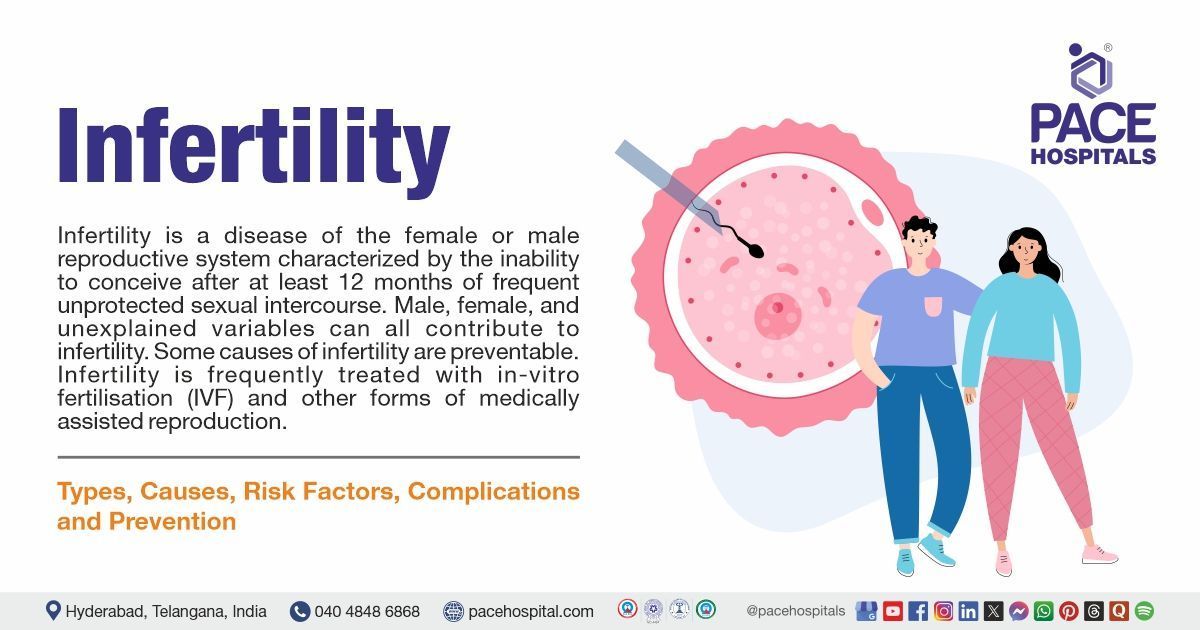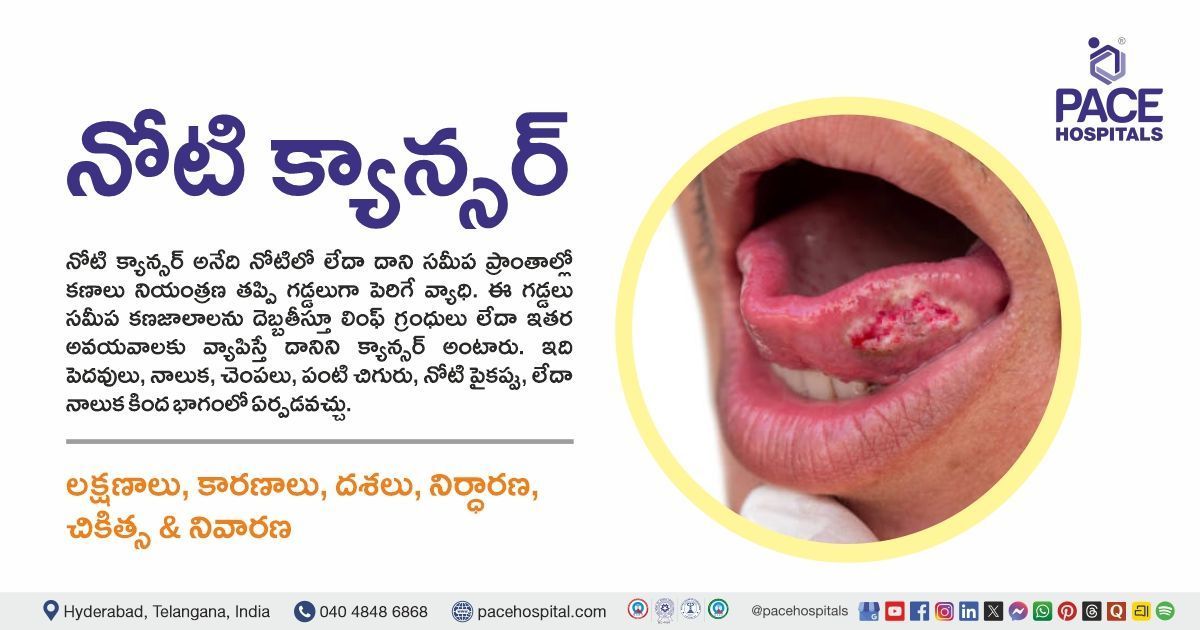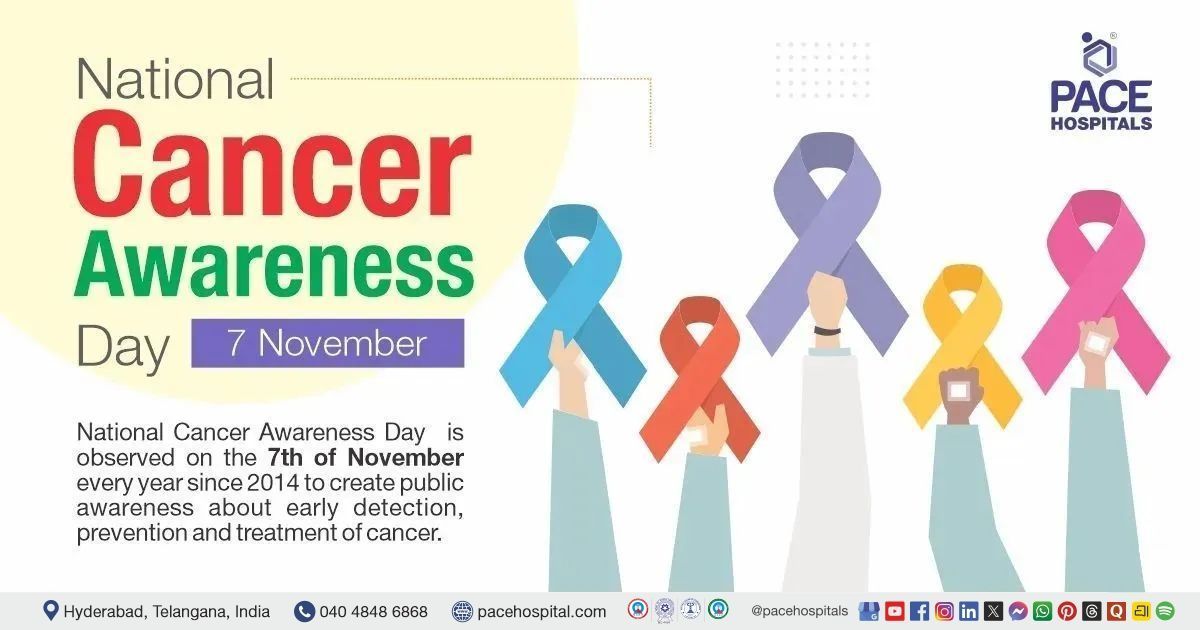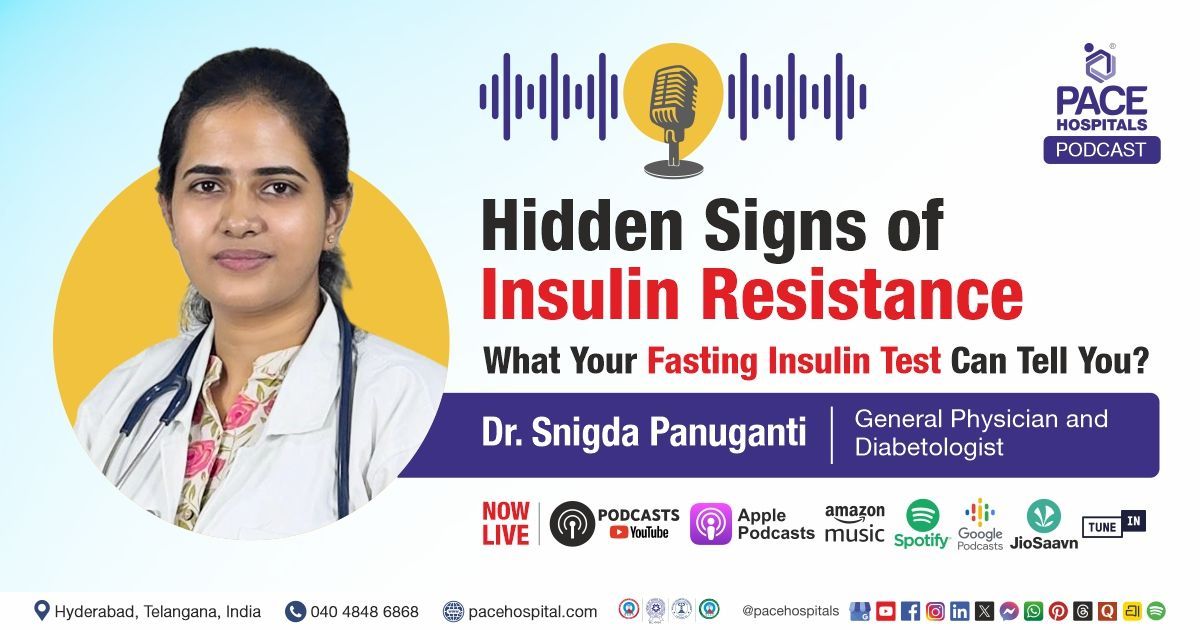Infertility: Types, Causes, Symptoms, Treatment and Prevention
PACE Hospitals
Infertility definition
Infertility is a disease of the female or male reproductive system characterized by the inability to conceive after at least 12 months of frequent, unprotected sexual intercourse. Male, female, and unexplained variables can all contribute to infertility. Some causes of infertility are preventable. Infertility is frequently treated with in-vitro fertilization (IVF) and other forms of medically assisted reproduction.
In vitro fertilization specialists, urologists, reproductive endocrinologists, and andrologists each play a crucial role in managing infertility issues.
Infertility meaning
The term “infertility” is derived from the French word "infertilité" which means unfruitful.
Prevalence of infertility
Prevalence of infertility in the world
As per the World Health Organisation (WHO), infertility affects around one in every six people globally, or 17.5% of the adult population. Infertility rates vary according to income level, with 17.8% in highly income countries and 16.5% in low- and middle-income countries.
Prevalence of infertility in India
Infertility rates in India vary by location, with estimates ranging from 3.7% to 16.8%.
Infertility is common among women in India, prevalence of female infertility in India estimates range from 4.6 to 18.7 per 1,000 women, depending on marriage duration and regional circumstances.
According to research, infertility prevalence increases as the duration of marriage reduces. On a state level, Goa, Lakshadweep, and Chhattisgarh have the highest infertility rates among women.
According to studies, the prevalence of male infertility in India is around 10-15%, which means that out of every 100 couples trying to conceive, 10-15 couples may have difficulties due to male infertility issues.

Types of infertility
Infertility is two types which include:
- Primary infertility
- Secondary infertility
Primary infertility- Primary infertility is the failure to get pregnant after one year of unprotected, regular intercourse, with no previous pregnancies.
Secondary infertility - Secondary infertility is where someone has had one or more pregnancies in the past and is having problems conceiving again.
Infertility symptoms
Infertility is a difficult and emotional experience for many people and couples. Recognizing the signs and symptoms of infertility is essential for identifying the potential causes and getting prompt medical attention for appropriate treatment and support.
Symptoms of infertility in men
Male infertility symptoms can be unclear. They may go unnoticed until a man wishes to have a baby.
The clinical manifestations (symptoms) vary depending on the cause of infertility. They could include:
- Hair growth changes
- Changes in libido (sexual desire)
- Pain, lump, or swelling in the testicles
- Small, firm testicles
- Problems with erections or ejaculation
Female infertility symptoms
Changes in ovulation and the menstrual cycle in women may indicate an infertility-related illness. Symptoms of infertility in women include:
- Abnormal menstrual cycles. Bleeding is unusually heavy or mild
- Irregular periods. The number of days between each menstruation varies from month to month.
- No periods. Women may never have a period, or the periods have stopped unexpectedly
- Painful periods. Back pain, pelvic discomfort, and cramps may occur
Female infertility can occasionally be caused by a hormonal imbalance. Symptoms that may develop due to hormone imbalance include:
- Skin changes, including increased acne
- Changes in sexual drive and desire
- Dark hair growth on lips, chest, and chin
- Hair loss or thinning
- Weight gain
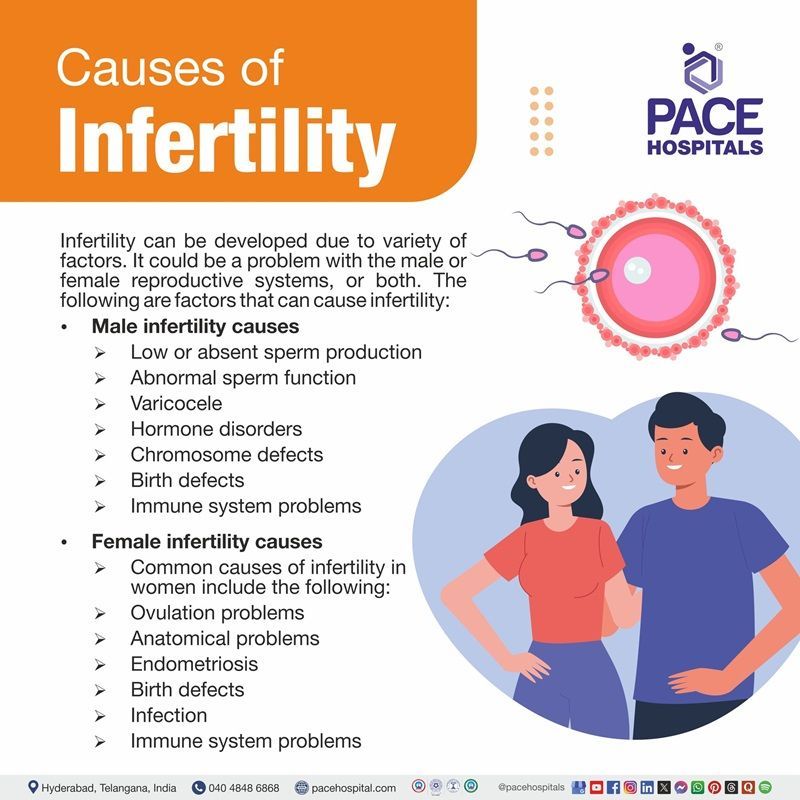
Causes of infertility
Infertility can develop due to a variety of factors. It could be a problem with the male or female reproductive system, or both. The following are factors that can cause infertility:
Male infertility causes
Male infertility is a rising concern that impacts many couples globally. Finding the root causes of male infertility is essential for providing effective treatments to improve the reproductive health of men. Causes of infertility in men include:
- Low or absent sperm production: Without enough motile sperm, the chances of fertilization can be reduced.
- Abnormal sperm function: If the sperm cells cannot swim and penetrate the egg, fertilization will not occur.
- Varicocele: Varicocele is a condition characterized by the development of varicose veins around the testes. It's a very common cause of infertility in men. Varicocele is generally treatable with surgical intervention.
- Hormone disorders: Abnormal male hormones or endocrine function may affect the production of sperm and fertility.
- Chromosome defects: Defects in certain chromosomes can cause infertility.
- Birth defects: Abnormalities in men's reproductive system can happen during the development stage in the mother's womb. Some birth defects may occur due to a man's exposure to certain medications taken by the mother during the pregnancy period.
- Immune system problems: A male may possess antisperm antibodies, which attack and destroy sperm.
Female infertility causes
Various physical, hormonal, and lifestyle factors might contribute to female infertility. Understanding these underlying factors is important for diagnosing infertility and provide suitable treatments for women struggling to conceive.
Common causes of infertility in women include the following:
- Ovulation problems: Ovulation problems arise when women do not make enough hormones to mature, develop, and release an egg.
- Anatomical problems: A problem within the woman's anatomy can prevent the fusion of sperm with the egg. The usual anatomical problem in women is a blockage in the fallopian tubes. Other anatomical problems may include scar tissue in the pelvis due to surgeries in the past or infections.
- Endometriosis: Endometriosis may cause infertility due to poor ovarian function, hormone imbalances, inflammation, and diminished endometrial receptivity. These factors disturb ovulation, fertilization, and embryo implantation, greatly affecting the chances of conception in women with the condition.
- Birth defects: Certain birth defects can affect fertility. One of the most common problems occurs when a female foetus is exposed to medications like synthetic nonsteroidal estrogen in the mother's womb.
- Infection: Pelvic inflammatory disease (PID) is a bacterial infection caused by bacteria such as gonorrhoea and chlamydia. This condition can affect the fallopian tubes, uterus, and ovaries, leading to scar tissue formation between the organs. This leads to persistent pelvic pain and raises the risk of an ectopic pregnancy (implantation of a fertilized egg outside the uterus).
- Immune system problems: Pregnancy loss can result due to problems within a woman's immune system. Antibodies in a woman's body may fail to detect a pregnancy. Women may also produce anti sperm antibodies, which attack and destroy sperm.
Infertility risk factors
Identifying the risk factors of infertility is critical for understanding its causes. Fertility can be influenced by a number of factors, including age, lifestyle choices, and underlying medical issues. Recognising these risks early on might help patients seek proper medical assistance and treatment.
Risk factors for infertility in females
Some factors may affect how easily a woman ovulates, gets pregnant, or delivers a child. Risk factors for infertility in females include:
- Age: Women 30 years and older are usually less fertile than women who are in their 20s to 30 years old.
- Endometriosis
- Chronic conditions like diabetes (increased blood glucose), arthritis, hypertension (increased blood pressure), and asthma
- Hormonal imbalance
- Environmental factors. These include smoking, alcohol consumption, and exposure to toxins.
- High or low body fat
- Estrogen receptor agonist taken by females during pregnancy
- Sexually transmitted diseases
- Fallopian tube disease
- Multiple miscarriages
- Uterine Fibroids (non-cancerous growth in the uterus)
- Abnormalities in the uterus that occur at birth or later in life
Risk factors for infertility in males
Infertility not only affects women, but it also affects men as well. Here is a list of things that can be risk factors for male infertility:
- History of prostatitis (prostate gland inflammation), genital infection, or sexually transmitted diseases (STDs)
- Exposure to hazards or toxic substances. These include radioactivity radiation, welding fumes, and many chemicals.
- Cigarette smoking
- Heavy alcohol consumption
- Exposure of the genitals to higher temperatures
- Hernia repair surgery
- Undescended testicles (condition where the testes do not move into the scrotum)
- Prescription medicine. These include opioid like medications that affect the central nervous system (CNS).
- Mumps infection after puberty (after growing up)
- A genetic problem or a problem that was present at birth (congenital)
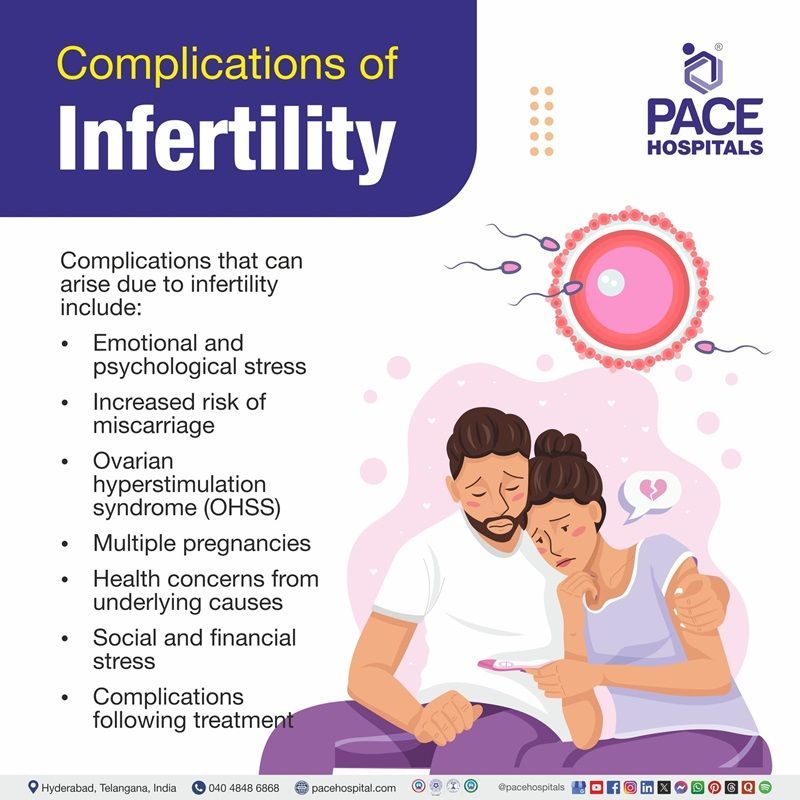
Complications of infertility
Infertility may cause several complications that may not be directly related to infertility treatments. These complications primarily arise from underlying reproductive disorders and can affect both physical health and pregnancy outcomes.
Complications that can arise due to infertility include:
- Emotional and psychological stress: The inability to conceive may lead to feelings of frustration, depression, anxiety, and relationships strain.
- Increased risk of miscarriage: Infertility treatments, such as assisted reproductive technologies, may increase the likelihood of early pregnancy loss.
- Ovarian hyperstimulation syndrome (OHSS): A side effect of fertility treatments, OHSS can cause swollen, painful ovaries and, in rare cases, lead to severe consequences like blood clots or organ failure.
- Multiple pregnancies: In vitro fertilization (IVF) and other fertility treatments can raise the likelihood of multiple pregnancies, such as twins or triplets, which carry a higher risk of premature birth and difficulties for the mother and her unborn children.
- Health concerns from underlying causes: Infertility-causing conditions such as endometriosis, male factor infertility, or polycystic ovarian syndrome (PCOS) can also result in chronic pain, hormone imbalances, or cardiovascular problems.
- Social and financial stress: Infertility treatments can be expensive, which puts a strain financially. Furthermore, guilt and stigma related to infertility might have a negative impact on mental health.
- Complications following treatment: Depending on the therapy, some infertility treatments may result in infections, scars, or harm to the reproductive organs.
Infertility diagnosis
To diagnose infertility, both men and women are tested.
Generally, the healthcare expert will test both partners to find the cause of infertility. The healthcare provider may ask for answers to questions such as:
- Does the woman ovulate on a regular basis?
- Does the male produce sperm that are healthy?
- Can the male's sperm and the female's egg combine and develop normally?
- Are there any implantation-related issues?
- Will the mother be able maintain the pregnancy?
Diagnosis of infertility in females
Female infertility tests and diagnoses assist in identifying underlying causes and guiding treatment options to increase the likelihood of pregnancy
An OBG-GYNEC (obstetrician gynaecologist) or a reproductive endocrinologist may diagnose infertility based on:
- Medical history and physical examination
- Ovulation evaluation
- Hormone testing
- Ultrasound
- X-rays
Male infertility diagnosis
Male infertility tests and diagnoses assess sperm count, motility, and hormone abnormalities to establish the optimal treatment plan.
Common diagnostic tests that are done in males to diagnose infertility include:
- Semen analysis
A sample of semen is collected and examined in a laboratory. The healthcare expert may:
- Evaluate the sperm count
- Test motility of the sperm
- Check the shape of the sperm
- Evaluate the ejaculate liquid
Other tests may be performed to examine the sperm's capacity to fuse with the egg, as well as male hormone testing.
Male patients may be referred to a urologist for further testing
Infertility treatment
The healthcare expert may discuss the best treatment based on:
- The patient’s age
- Overall health and medical history
- How well the patient can handle specific procedures, medications, or therapies
- How long the condition is expected to last
- The patient's preference
A lot of people with infertility are treated with conventional methods. These includes the use of medication or surgery to correct reproductive problems. There are numerous options available to infertile couples, depending on the cause of their infertility.
Types of treatments for women may include:
Intrauterine insemination: This technique inserts carefully cleaned and prepared sperm straight into the uterus using a tiny, flexible tube known as a catheter.
Ovulation medicine: These medications help to regulate the timing of ovulation. Some of the common medicines include:
- Estrogen receptor modulators
- Human menopausal gonadotropins. Medicines with follicle-stimulating hormone (FSH) and luteinizing hormone (LH)
- Follicle-stimulating hormone (FSH)
Surgery: Surgery may be used to treat or repair a condition such as blocked fallopian tubes or endometriosis.
Assisted reproductive technology (ART). Some couples require more comprehensive treatment. In most types of ART, the sperm and egg are combined in the laboratory. The fertilised egg is subsequently returned to the woman's uterus to implant and develop. While ART procedures can be expensive, many are successful. These include:
- In vitro fertilization
- Intracytoplasmic sperm injection (ICSI)
- Gamete intrafallopian transfer (GIFT)
- Zygote intrafallopian transfer (ZIFT)
- Donor eggs (This involves transferring an embryo from a donor to an infertile woman)
- Freezing of embryo (Embryo cryopreservation)
Male factor infertility has a variety of treatment options available. Possible treatments include:
Assisted reproductive technologies (ART): This type of treatment may include:
- Artificial insemination (procedure in which sperm is introduced into a female's reproductive system in order to induce pregnancy)
- In vitro fertilization (IVF), Gamete intrafallopian transfer (GIFT), and other techniques
- Microsurgical fertilization (microinjection techniques, such as intracytoplasmic sperm injection).
Medicine therapy
- Hormone therapy
- Gonadotrophin therapy
- Antibiotics
Surgery
Surgery for male infertility is performed to correct anatomical issues that prevent sperm production, maturation, or ejaculation.
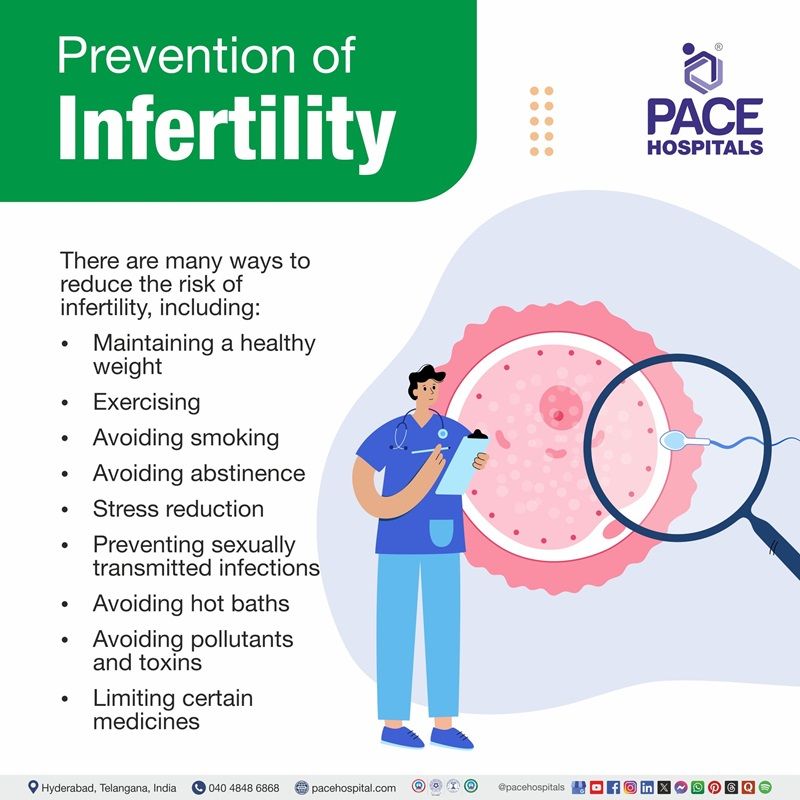
Prevention of infertility
Infertility is becoming an important concern for many couples, impacting both men and women. Understanding the reasons and addressing potential hazards early can dramatically improve reproductive health outcomes, allowing people to make more informed decisions about their fertility and general well-being.
There are many ways to reduce the risk of infertility, including:
- Maintaining a healthy weight: Being underweight or overweight can raise the likelihood of ovulation issues. The recommended body mass index (BMI) for healthy adult females is 18.5 to 24.9.
- Exercising: Sedentary lifestyles have been linked to hormonal imbalances, weight gain, and other factors that may affect reproductive health in both men and women; essentially, regular moderate exercise is generally considered beneficial for fertility, whereas a sedentary lifestyle can increase the risk of infertility.
- Avoiding smoking: For both men and women, smoking can have an adverse impact on fertility.
- Avoiding abstinence: Heavy alcohol consumption can reduce fertility and harm the health of a growing baby.
- Stress reduction: Stress may have a negative impact on fertility in both men and women by disturbing hormonal balance, specifically influencing sperm quality in males, and ovulation in females and potentially leading to difficulty conceiving owing to irregular menstrual cycles, diminished egg quality, and decreased sperm motility. While stress alone may not directly cause infertility, chronic high stress levels can significantly decrease the chances of pregnancy.
- Preventing sexually transmitted infections: Preventing sexually transmitted infections (STIs) such as gonorrhea and chlamydia can help lower the risk of infertility.
- Avoiding hot baths: Frequent hot baths can temporarily impair sperm production and motility.
- Avoiding pollutants and toxins: Pesticides, lead, cadmium, and mercury can impair the body's ability to produce sperm.
- Limiting certain medicines: Some medications can affect fertility. It's essential to avoid excessive usage of certain medications, especially those that change hormone levels or reproductive health.
Difference between sterility and infertility
Sterility vs Infertility
Sterility and infertility both impair the capacity to conceive, although their duration and causes differ. While sterility is a lifelong, irreversible illness, infertility can be transient and treatable, with medical procedures providing the opportunity for conception in many situations.
The key differences between sterility and infertility are listed below:
| Aspect | Sterility | Infertility |
|---|---|---|
| Definition | Complete inability to conceive a child | Inability to conceive after a year of regular, unprotected sex. |
| Cause | Typically caused by permanent medical conditions. | Can be caused by temporary or treatable factors. |
| Treatment options | No treatments available for sterility. | Treatments like medication or assisted reproductive technologies may help. |
| Medical condition | Permanent, irreversible condition. | Can be temporary or reversible with proper treatment. |
| Fertility potential | No possibility of natural conception. | May still be possible with medical intervention. |
| Diagnosis | Confirmed through medical tests showing no ability to reproduce. | Diagnosed through tests indicating difficulty conceiving but potential for success. |
Frequently Asked Questions (FAQs) on Infertility
Can PCOS cause infertility?
Yes, Polycystic Ovary Syndrome (PCOS) is one of the most common causes of infertility in women, partly because it frequently leads to irregular menstrual cycles and lack of ovulation, making it difficult to conceive.
Can male infertility be cured?
Male infertility can frequently be treated and reversed depending on the underlying cause, with options including medication, surgery to correct blockages, lifestyle changes, and assisted reproductive technologies such as in-vitro fertilization (IVF), potentially allowing for conception; however, in some cases, male infertility may not be fully reversible and may require assisted reproductive techniques to achieve pregnancy.
Does erectile dysfunction cause infertility?
Though erectile dysfunction doesn't necessarily damage sperm or cause male infertility directly, it might affect a man's ability to maintain an erection to execute sexual intercourse and properly fertilize an egg.
Will eating chicken have infertility problems in women?
Yes. A study found that eating excess protein from poultry or red meat may raise the chance of infertility due to anovulation (inability of ovaries to release egg).
Can type 2 diabetes cause infertility?
Yes, type 2 diabetes can lead to infertility in both men and women. Diabetes can affect sperm quality, motility, and DNA integrity. It can also cause erectile dysfunction (ED). Diabetes can induce irregular or absent periods, resulting in infertility. It may also raise the risk of miscarriage.
What is male infertility?
Infertility in males is defined as men's inability to impregnate a female partner due to problems within their sperm production, quality, or delivery, which essentially means that men are unable to conceive a child with their partner despite having tried for a significant period with regular unprotected sex; this can be caused by a low sperm count, abnormal sperm morphology, or sperm movement issues.
Can ovarian cyst cause infertility?
Many ovarian cysts may not affect the likelihood of getting pregnant. However, cyst-related diseases such as endometriosis or polycystic ovary syndrome (PCOS) can affect fertility.
Do fibroids cause infertility?
Yes. By blocking the fallopian tubes and affecting gamete movement, fibroids can result in infertility.
Can abortion cause infertility?
No, abortion usually does not cause infertility. Having an abortion will not reduce the chances of achieving pregnancy and having normal pregnancies in the future. Many women are able to conceive quickly thereafter.
Can endometriosis cause infertility?
Yes, endometriosis can significantly increase the risk of infertility, with studies showing that between 30-50% of women with endometriosis may experience difficulty in conceiving pregnancy due to the condition affecting the fallopian tubes, ovaries, and pelvic area with scar tissue and adhesions that can obstruct egg travel and implantation.
Yes, while uncommon, mumps can cause infertility in males, primarily by inflaming the testicles (orchitis), which can disrupt sperm production and potentially lead to reduced fertility or infertility, particularly if both testicles are affected; however, most cases of mumps-related orchitis do not result in permanent infertility.
A well-balanced diet high in antioxidants, healthy fats, and critical vitamins can boost fertility. Foods including leafy greens, berries, nuts, seeds, whole grains, and fatty fish are good for both male and female reproductive health.
Which vitamin fight against infertility?
Vitamin E is frequently related to promoting conception. It serves as an antioxidant and is thought to help protect reproductive cells from harm, improve egg quality in women, and improve sperm health in men. Vitamin D is also important for fertility since it regulates reproductive hormones.
Which type of medication cause infertility in men?
Many classes of drugs can have a negative impact on male fertility, including analgesics, anti-arrhythmic agents, anti-bacterial agents, anticonvulsants, antidepressants, antihypertensive agents, Antineoplastic agents, Anti-Parkinson agents, etc.
When is it said that a couple is infertile?
A couple is termed infertile if they are unable to conceive after one year of unprotected and regular sexual intercourse; if the woman is over 35 years old, this timeframe can be reduced to six months of attempting.
Can birth control pills cause infertility?
There can be a lot of misconceptions about birth control and fertility. However, hormonal contraceptives do not induce infertility, regardless of whatever technique the women choose or how long the women have been using them.
Can cell phone radiation cause female infertility?
According to current research, while some studies demonstrate a potential association between cell phone radiation and female infertility, most experts believe cell phone radiation levels are too low to directly cause fertility concerns in women.
Can stem cells cure infertility?
Stem cells are multipotent cells (cells that can develop into several distinct cell types) that can divide into other cells for repair, development, and regeneration. Experimental model studies demonstrate that treating infertility with stem cell treatment is gaining acceptance.
Can radiation cause infertility?
Yes, radiation exposure, particularly to the reproductive organs can considerably induce infertility in both men and women by destroying the cells responsible for sperm and egg formation. The level of infertility depends on the radiation dose and the area being treated.
Does laptop heat cause infertility?
According to research, there is a possible link between laptop use and male infertility. Studies have discovered that the heat from a laptop may raise the temperature of the testicles when propped on a man's lap, which can impact sperm production.
Share on
Request an appointment
Fill in the appointment form or call us instantly to book a confirmed appointment with our super specialist at 04048486868

